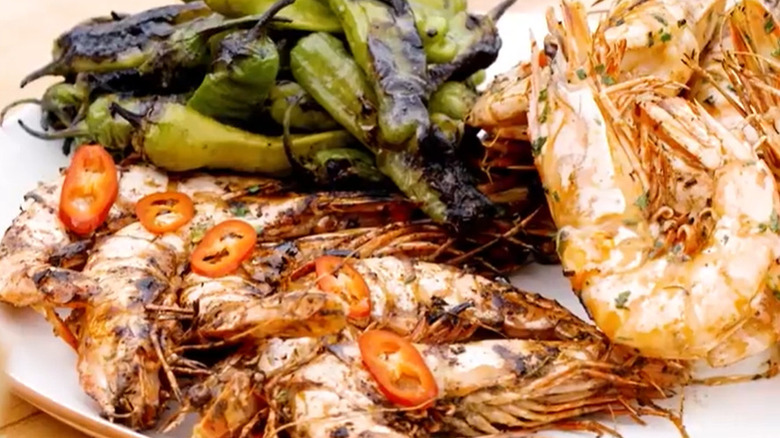Why Andrew Zimmern Likes To Grill Shrimp With Shells On
We've been saying it for years, when you're cooking shrimp, there is no good reason to remove the tails. This is especially true if your shrimp are destined for shrimp cocktail because, among other things, the tail makes a nifty little handle that you can hold onto when dipping in cocktail sauce. Moreover, we have also made the point that unless you're cooking shrimp for shrimp cocktail, there's really no reason to remove the shells, either. Of course, we get that while shrimp shells are perfectly safe to eat, you may not be used to doing so because "common western cuisine tends to remove the shells," according to Best of Culinary. That said, it's become increasingly commonplace to leave the shells on.
Why, you ask? Well, not for the sake of laziness, that's for certain. In fact, when Epicurious tried to convince people to stop ignoring the awesomeness of shrimp shells, their suggestion was to go ahead and peel the shrimp, but to keep the shells for stock because they're "packed with rich sugars that easily react and infuse into water." But why go to all that trouble when keeping the shells on can make your shrimp sing with all the richness of those sugars, which, let us not forget, will also encourage the Maillard reaction to occur? But that's not the only reason to leave those shells on, according to celebrity chef Andrew Zimmern.
There's nothing 'bizarre' about shrimp with the shell on
Chef and writer Andrew Zimmern hosts the Travel Channel's erstwhile "Bizarre Foods," but just to be clear, there is nothing whatsoever bizarre about leaving the shells on shrimp before grilling or sautéing them. In fact, it appears that keeping the shells on is simply the best way to approach the task. On July 12, Zimmern took to Instagram to post a brief video of his process for grilling jumbo shrimp, which begins with leaving the shells on (the gorgeous result is pictured above, via Instagram). According to Zimmern's post, the shell "imparts a distinct flavor to the shrimp." It also "acts as a heat buffer, helping to prevent overcooking."
That latter point is particularly important when you're working with larger shrimp because "jumbo shrimp take more time to cook through, allowing them to stay in contact with the heat long enough to develop a char. For the juiciest shrimp, grill them with the shell on."
It's not the first time Zimmern has offered this advice, by the way. He also has delivered the very same message via his website in connection with Zimmern's recipe for Grilled Jumbo Shrimp, Two Ways. As you can see from the photo, it appears that it is Zimmern's intention that not only should we cook shrimp with the shells on, but that is precisely how it should be served (and eaten).

